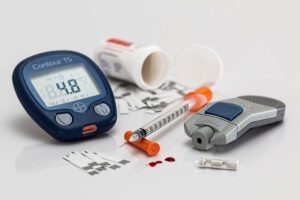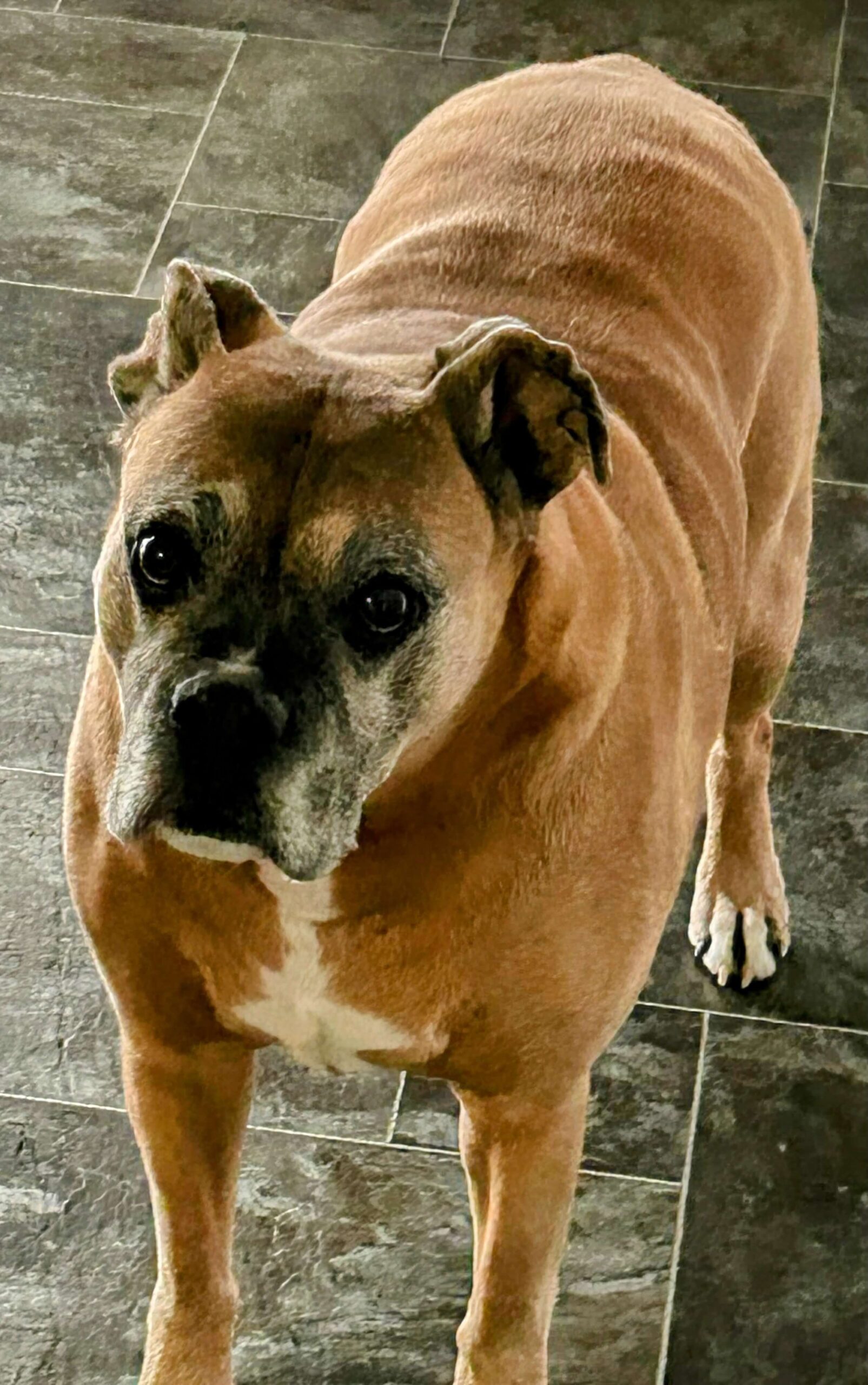This post contains affiliate links. See our Affiliate Disclosure Statement page for more details.
Table of Contents
Boxer Dog Always Hungry?
Is your Boxer dog always hungry? Boxer dogs are known for having voracious appetites. Ask any Boxer owner and they can contest to their Boxers appetite.
However, sometimes it seems that no matter how much they eat, they are giving you a sad look for more food, begging at the table, sniffing or licking their food bowl, or eating non-food items.
These may be a signal that there are underlying issues causing your Boxer dog to be constantly hungry. This article examines the 3 best sources to focus on and share with your veterinarian to help them identify the sources of the issue.
Boxer Dog Always Hungry? 3 Best Sources To Evaluate
- Underlying Medical Issue
- Inadequate Nutrient Intake
- Boredom or Lack of Physical Exercise
Disclaimer: We are not veterinary professionals. The information being provided is based on our research and our own personal experiences. We recommend seeking care and treatment from your veterinarian when you suspect your dog is having issues. They can identify the source of the issues and provide a treatment plan suited to your individual dog’s needs.
Underlying Medical Issue
One of the most common reasons that may be causing your Boxer dogs to be constantly hungry is an underlying medical issue. There are a host of medical issues that can cause an insatiable appetite in dogs. These include but are not limited to
- Metabolic Diseases – Diabetes Mellitus
- Thyroid Problems – Hypoglycemia
- Cushing’s Disease – Hyperadrenocorticism
- Exocrine Pancreatic Insufficiency (EPI)
- Parasites
- Cancers
- Medications
- Psychological issues – stress and anxiety
These medical issues can cause a variety of symptoms that may lead you to seek medical attention from your veterinarian.
- Increased thirst & urination
- Vomiting & Diarrhea
- Changes in weight (gain or loss)
- Developing a pot belly or losing muscle tone
- Eating non-food type objects
- Source: Why is My Dog Always Hungry, Petmd.com (June 2022)
Boxer Dog Always Hungry – Diabetes Mellitus

Diabetes Mellitus is a metabolic disease of the Endocrine system that occurs when the Pancreas is not producing enough insulin or stops producing insulin which causes there to be too much glucose (sugar) in the bloodstream.
One of insulin’s primary functions is to allow glucose (sugar) to enter the body’s cells, who in turn use the sugar for energy. It is similar to putting a key in the lock of a door. The insulin is the key, that unlocks and opens the door so that the glucose can go through the door and into the cell.

When not enough insulin is available in the bloodstream to carry glucose into the cells, they have to look for other sources of energy. Which is usually fat storage.
As the dog’s body uses up its fat storage, it begins to lose weight. This weight loss stimulates the dog’s appetite to help maintain the nutrients the dog’s body needs.
As the dog’s body continues to eat, the excess glucose from breaking down the food builds up in the blood, which signals the brain to get rid of the excess sugar. The dog gets rid of the excess sugar with frequent urination.
The frequent urination causes the dog to be thirsty and it will often drink excessively to replace the fluids it is losing through urination.
Symptoms of Diabetes Mellitus in Dogs
The symptoms of Diabetes Mellitus Include:
- Frequent Urination
- Frequent Thirst
- Weight Loss
- Increased Appetite
According to the article Diabetes Mellitus in Dogs – Overview, VCA Hospitals, Krista Williams, DVM, Robin Downing, DVM, and Ernest Ward, DVM, there are 3 types of diabetes in dogs.
- Type I – Insulin-dependent Diabetes
- “results from total or near-complete destruction of the insulin-producing beta cells. This is the most common type of diabetes in dogs. As the name implies, dogs with this type of diabetes require insulin injections to stabilize blood sugar.”
- Type II – Non-Insulin Dependent Diabetes
- “some insulin-producing cells remain, but the amount of insulin produced is insufficient, there is a delayed response in secreting it, or the tissues of the dog’s body are relatively insulin resistant. Type II diabetes may occur in older obese dogs.”
- The authors note that dogs typically don’t respond well to oral medications that help the dog stimulate the production of insulin.
- Type III Diabetes
- “results from insulin resistance caused by other hormones and can be due to pregnancy or hormone-secreting tumors.”
If your dog requires prescription or OTC medication, we use and recommend Pet Care Rx, they have a large inventory of prescription medications, and provide quick delivery and excellent customer service.
Save an Extra 25% OFF Sitewide + Enjoy Free Standard Shipping on orders $48+ only at PetCareRx.com! Use Code: CARE25Treatment for Diabetes Mellitus in Dogs
According to the VCA Article, the authors state that the typical course of treatment for Diabetes Mellitus requires
- Two insulin injections per day
- A weel-controlled nutritious diet that needs to be fed at the same times every day
These measures will help keep the disease under control.
If you notice any of the symptoms of diabetes, contact your veterinarian immediately so that can evaluate and provide a treatment plan for your dog.
Boxer Dog Always Hungry? Thyroid Problems
Is your Boxer dog always hungry? One of the causes may be related to a Thyroid problem – Hypoglycemia.
Hypoglycemia occurs when the blood sugar in the bloodstream is too low. This can be a serious condition because glucose provides energy to the cells. According to the research, hypoglycemia is commonly seen in veterinary practices.
Causes of Hypoglycemia
According to the research article Hypoglycemia in Dogs: Causes, Management and Diagnosis, The Canadian Veterinary Journal, Idowu and Heading, (Jun 2018), the cause of Hypoglycemia can be categorized by being physiological or pathological.
Table 1 below outlines the cause of hypoglycemia and the resulting effect on the body.
| Physiological Causes | Physiological effects |
| Extreme exercise | Using excess glucose (sugar) Not enough energy storage (glycogen) |
| Neonatal or Juvenile | Not enough energy storage (glycogen) Limited fat stores and muscle mass |
| Malnutrition/Starvation | Not enough nutrients to produce glucose for energy Depleting the energy storage (glycogen) |
| Pathological Causes | Physiological effects |
| Liver Disease | Decreased production of glucose (glycogenesis) by the liver |
| Hypoadrenocorticism Hypopituitarism | Decreased glucose production due to lack of counterbalancing growth hormone |
| Infection | Decreased glucose production and increased glucose use |
Boxer Dog Always Hungry? Hypoglycemia Treatment
Treatment is based on severity. Mild cases may be treated with oral supplementation of glucose to help elevate the level of glucose in the bloodstream.
More severe cases may require the dog to be hospitalized where they are often treated with Intravenous (IV) doses of glucose to elevate their blood sugar levels. They need to be monitored by a veterinarian during this process.
If you suspect your dog may have hypoglycemia see a veterinarian as soon as possible so they can evaluate and treat your dog as necessary
Visit Chewy.com for higher protein dog foods that can provide the nutrition your Boxer dog needs because of their high energy and desire to play and exercise.
Save 35% on your first Chewy Autoship Order!Boxer Dog Always Hungry? Cushing’s Disease
One of the reasons your Boxer dog always hungry is because they may have Cushing’s Disease.
Cushing’s Disease, also known as hyperadrenocorticism, is a disease caused when the adrenal glands, which sit on top of the kidneys, produce too much Cortisol, a hormone, often referred to as the “stress hormone”.
According to the article Treating Cushing’s Disease in Dogs – Food and Drug Administration (FDA), (7/2021), Dr. Ann Stohlman, V.M.D., FDA Center for veterinary medicine states “Cortisol is one of the body’s natural steroids,” and the “that a normal amount of cortisol helps the body adapt in times of stress”.
According to the FDA article, Cortisol plays a key role in
- Regulating proper body weight
- Regulating Tissue Structure
- Regulating skin Condition
However, too much Cortisol being released by the Adrenal Glands can have a detrimental effect on your dog’s immune system. A weakened immune system caused by the excess Cortisol can predispose your dog to infections, and other health issues.
The FDA article states there are two types of Cushing’s disease in dogs that typically occur naturally.
- Pituitary-Dependent
- Adrenal-Dependent
According to the article 80-85% of Cushing disease in dogs is the Pituitary-Dependent Type, which is caused by a tumor on the Pituitary Gland, which is located at the base of the brain.
The remaining cases are Adrenal-Dependent Types, which are usually caused by a tumor on the adrenal gland.
Both types of Cushing’s disease are caused when these tumors cause the stimulation and production of too much cortisol in the bloodstream.
Symptoms of Cushing’s Disease
The FDA article notes that Cushing’s Disease usually develops in middle-aged to older dogs. They outline the following symptoms
- increased thirst
- increased urination
- increased appetite
- reduced activity
- excessive panting
- thin or fragile skin
- hair loss
- recurrent skin infections
- enlargement of the abdomen, resulting in a “potbellied” appearance
- Source: Food and Drug Administration (FDA) – Cushing Disease in Dogs
Treatment for Cushing’s Disease
Most cases of Cushing’s disease can be controlled and managed by your veterinarian with the use of medications that help to control cortisol levels in the body.
Surgery to remove the tumor on the pituitary of the adrenal glands can be conducted but is often not done because of the complication of the surgery and the location of the tumors, particularly on the Pituitary gland.
If your dog shows any of the symptoms of Cushing’s Disease it should be evaluated by your veterinarian as soon a possible so they can run diagnostic tests and if confirmed can develop a treatment plan for your dog.
If your veterinarian prescribes medications for your dog visit Chewy.com Pharmacy to check medication prices
20% Off Your First Chewy Pharmacy Order use Code RX20 at CheckoutBoxer Dog Always Hungry? Exocrine Pancreatic Insufficiency
Boxer dog Always Hungry? It may be due to Exocrine Pancreatic Insufficiency (EPI) which is a disease caused when not enough pancreatic enzyme is produced to be able to digest the 3 major macronutrients: Proteins, Fats, and Carbohydrates.
For additional information on Exocrine Pancreatic Insufficiency (EPI), read our article Why is my Boxer Dog Not Eating: Understanding the Causes and Solutions, which goes into great detail on this disease.
Boxer Dog Always Hungry? Parasites
Boxer dog always hungry even after eating? It may be caused by a parasite living in the dog’s GI tract or bloodstream stealing nutrients from your dog.
Common parasites that your dog may be infected with and may make your Boxer dos always hungry
- Tapeworms
- Whipworms
- Heartworms
- Roundworms
Tapeworms
Tapeworms are flat segmented worms that have hook-like mouthparts. Tapeworms use hooks to attach to the small intestine in the GI tract where nutrients are absorbed and feed off of those nutrients to continue to grow.
According to the Centers for Disease Control (CDC), tapeworms can grow as long as 28 inches.
The bigger the tapeworm becomes, the more nutrients it consumes from the dog which can cause the dog to feel hungry because it is not getting the nutrients it requires.
Tapeworm infestations can occur when a dog consumes an infected flea while grooming that is carrying tapeworm eggs. Once eaten, the tapeworm eggs hatch, and the larvae travel to the small intestine and attach to the lining and grow into adults.
Symptoms and Treatment
Signs and Symptoms of Tapeworm infection include
- Scootching or dragging their butts across the floor to relieve itching
- White. moving rice-shaped segments moving around the dog’s anus or in their feces.
Your veterinarian will treat your dog with deworming medication to kill the tapeworms. The dead tapeworms are usually digested by the dog and may or may not pass in the feces.
Check Amazon for prices on a selection of de-worming medications.
Boxer Dog Always Hungry? Cancers
If your Boxer Dog always hungry, it may be related to having certain types of cancers. Boxers are a dog breed that is pre-disposed to developing cancer.
Cancers causing increased appetite in your dog, often affect organs or glands that are involved in food metabolism and digestion or that produce growth hormones.
Examples of cancers may include:
- Pituitary or Adrenal Tumor
- Tumors of Insulin producing organs or glands
- Liver tumors
Symptoms may include:
- Subtle or drastic weight loss
- Increased appetite
- Lumps
- Fatigue
- Increased Thirst & Urination
If you suspect or notice symptoms of cancer, see your veterinarian immediately to diagnose and develop a treatment plan.
Boxer Dog Always Hungry? Stress and Anxiety

Like humans, Boxer dogs may want to eat all the time when they are under stress or suffering from anxiety. Stress and anxiety can also have the opposite effect and decrease your pet’s appetite.
It is important to help identify and reduce the levels of stress and anxiety to reduce your dog’s urge to want to eat.
For additional information on how stress and anxiety impact a dog’s appetite, read our article Why is My Boxer Dog Not Eating? Understanding Causes and Solutions.
Inadequate Nutrient Intake
If your Boxer dog always hungry, it may be due to inadequate nutrient intake. This may be related to a number of factors including
- Homemade diets that don’t include all the essential nutrients needed for a dog
- Poor or low-quality commercial kibble or wet food
- Parasites
- Diseases affecting vitamin and mineral absorption
If you notice changes in weight, skin and coat, hair loss, fatigue, and lethargy it may be due to inadequate nutrient intake.
Schedule an appointment with your veterinarian to have your dog evaluated and share their current diet during the visit.
Boredom & Lack of Exercise
One of these reasons your Boxer dog always hungry is because they are bored. Just like humans, when we are bored we often look for something to eat and then say to ourselves “Why did I eat that, I’m not even hungry?”
Boxer dogs are a high-energy breed that needs lots of physical exercises and mental stimulation. When these are lacking this can lead to destructive behaviors or the need to want to eat more.
Ensure your Boxer is getting plenty of daily exercises and mental stimulation to help prevent boredom and the desire to constantly want to eat.
For additional information on exercise and mental stimulation for Boxer dogs read our articles
How to Tire Out a Boxer Dog – 5 Best Ways to have a Calm, Happy Boxer Dog
Boxer dog Exercises – 3 Best Types of Exercises from Puppy to Senior Dog
9 Best Ways To Mentally Stimulate Your Boxer Dog for a Happy, Obedient Companion
Visit Cherrybrook and Rover.com for a wide selection of dog toys for exercise and mental stimulation.
Rover Recommended ToysSummary
If your Boxer dog always hungry there are 3 main sources to evaluate and share with your veterinarian to identify the source of the issue.
These include
- Medical Issue
- Inadequate Nutrition
- Boredom & Lack of Exercise
So, if your Boxer dog is giving you sad eyes, and begging for food soon after eating, it may be due to one of the sources listed above. Working with your veterinarian to identify the source of the problem can help ensure you have a happy, healthy Boxer dog.

Discoverboxerdogs.com are Mary and Chris Kustanbauter. We reside in Red Lion, PA with our two Boxers, Duke, and Katie, who are both rescue dogs. We have been working with Adopt A Boxer Rescue for the past 17 years and have adopted 5 Boxers from this fine organization. To learn more visit our Home, Boxer Dog Family, and Blogs Pages Visit us on social media on Facebook – Discoverboxerdogs.com, Instagram, and Pinterest.

